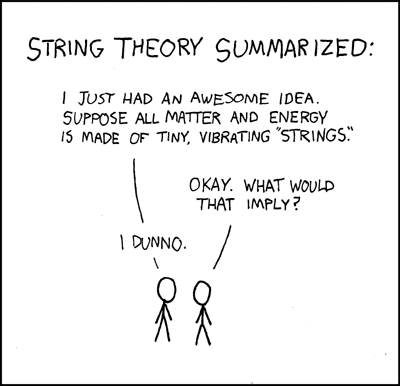I ended up adding an additional chapter to the book about this, and covering developments closely here on the blog. For many years I found it impossible to believe that this pseudo-scientific point of view would get any traction among most leaders of the particle theory community. How could some of the smartest scientists in the world decide that this was anything other than an obviously empty idea? After a while though, it became clear that this was getting traction and that there was a very real danger that particle theory would come to an end as a science, with most influential theorists giving up, justifying doing so by claiming they now had a solid argument for why there was no point in trying to go further. String theory is the answer, but the answer is inherently unpredictive and untestable.
It has become clear recently that we’ve now reached that end-point. From the new video of his discussion with Rovelli, it’s clear that David Gross has given up. No more complaints about the multiverse from him, and his vision of the future has string theory solving QCD 80 years from now, nothing about it ever telling us anything about where the Standard Model comes from. Today brought an extremely depressing piece of news in the form of a CERN Courier interview with Witten. Witten has also given up, dropping his complaints about the string theory landscape:
Peter WoitReluctantly, I think we have to take seriously the anthropic alternative, according to which we live in a universe that has a “landscape” of possibilities, which are realised in different regions of space or maybe in different portions of the quantum mechanical wavefunction, and we inevitably live where we can. I have no idea if this interpretation is correct, but it provides a yardstick against which to measure other proposals. Twenty years ago, I used to find the anthropic interpretation of the universe upsetting, in part because of the difficulty it might present in understanding physics. Over the years I have mellowed. I suppose I reluctantly came to accept that the universe was not created for our convenience in understanding it.
Quite extraordinary for a scientist to openly state that the universe is beyond our understanding, embracing agnosticism and abandoning the scientific method, along with any hope for future developments and novel ideas. The poor state of fundamental physics seems to reflect wider trends in society towards nihilism, ignorance, and rationalizing predominant narratives instead of striving for better solutions.

I remember reading about string theory in popular science magazines back in the 90’s, when this new branch of physics felt exciting and full of opportunities. It must be disappointing for the researchers who dedicated years of their careers to this field to be unable to find any experimental proof for so long. But the right answer to this is not to constantly fiddle with the theory making it increasingly complicated, nor to deny the need for experimental validation and resign to dangerous anti-scientific groupthink. The correct solution would be to start looking elsewhere… Ironically, this became a plot in the sitcom The Big Bang Theory, where Sheldon, frustrated by the lack of progress in his string theory research, at some point decides to break rank and abandon it outright. If only more real-life scientists would find such initiative…
Post a Comment